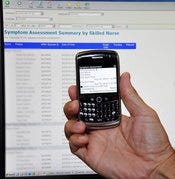President's Council Calls For Universal Data Exchange
A "universal exchange language" will facilitate the robust, secure electronic exchange of health information across institutions according a report from the President's Council of Advisors on Science and Technology.


Healthcare Innovators
Slideshow: Healthcare Innovators (click image for larger view and for full slideshow)
A new government report is urging the federal government to establishment a "universal exchange language" to facilitate the robust, secure electronic exchange of health information across institutions.
Further, the report calls for the nation's Chief Technology Officer, the Office of Management and Budget and the Department of Health and Human Services to collaborate on developing, within 12 months, a set of metrics to measure progress toward an operational health IT infrastructure nationwide.
Released Wednesday, the report, -- Realizing the Full Potential of Health Information Technology to Improve Healthcare for Americans: The Path Forward -- is the work of the President's Council of Advisors on Science and Technology (PCAST), which relied on its members, as well as experts in healthcare and information technology, to assess the current state of government efforts to modernize the nation's health IT systems.
While the document commends recent initiatives to spur health IT modernization such as the Electronic Health Record (EHR) incentive programs and initiatives to fund the development of health information exchanges, the report also found weaknesses in the federal government's approach and noted that: "federal efforts are not optimized to achieve the President's goals of improving the quality of healthcare and reducing its cost."
"We are already making great progress, but we've still got a long way to go," HHS Secretary, Kathleen Sebelius, said Wednesday at a Washington D.C. event to announce the release of the report.
While noting that the report shows the huge potential of health information technology to support doctors, empower patients, reduce paperwork, protect privacy, and improve the quality of care, Sebelius also said the adoption of electronic health records has comes with many challenges.
"It takes time to learn new technology, especially if you're a doctor in a small practice without a health IT staff. There's also the challenge of being able to share information securely with other providers if they have a different system. And then there's the fact that the systems can be expensive, even if they pay off in the long run," Sebelius said.

Health IT Boosts Patient Care, Safety
(click image for larger view)
Slideshow: Health IT Boosts Patient Care, Safety
The report reached the following six major conclusions:
-- HHS's vigorous efforts have laid a foundation for progress in the adoption of electronic health records, including through projects launched by ONC, and through the issuance of the 2011 "meaningful use" rules under HITECH.
-- In analyzing the path forward, PCAST concluded that achievement of the President's goals requires significantly accelerated progress toward the robust exchange of health information. The initial approach to meaningful use has focused on driving physicians to adopt EHR systems rather than on developing capabilities for broader sharing of patient data. Though the rule expresses an intent to require more robust exchange of health information among providers at later stages of meaningful use, its initial requirements that EHR systems communicate with each other are very modest.
-- There's a need to establish a "universal exchange language" that enables health IT data to be shared across institutions and to create the infrastructure that allows physicians and patients to assemble a patient's data across institutional boundaries, which adhere to privacy safeguards. Federal leadership is needed to create this infrastructure.
-- Creating the required capabilities for a "universal exchange language" is technically feasible, as demonstrated by technology frameworks with demonstrated success in other sectors of the economy. PCAST recommends using "tagged data elements," which breaks down information into units of data that are accompanied by a mandatory "metadata tag" that describes the attributes, provenance, and required security protections of the data. Universal exchange languages for metadata-tagged data, called "extensible markup languages" are widely and successfully used.
-- ONC should move rapidly to ensure the development of these capabilities; and ONC and CMS should focus meaningful use guidelines for 2013 and 2015 on the more comprehensive ability to exchange healthcare information. ONC should push for an evolutionary transition from traditional EHRs to a tagged data element model, along with a more rapid transition for the more limited purpose of data exchange by means of a universal exchange language.
-- Finally, as CMS leadership already understands, CMS will require major modernization and restructuring of its IT platforms and staff expertise to be able to engage in sophisticated exchange of health information and to drive major progress in health IT.
About the Author(s)
You May Also Like






